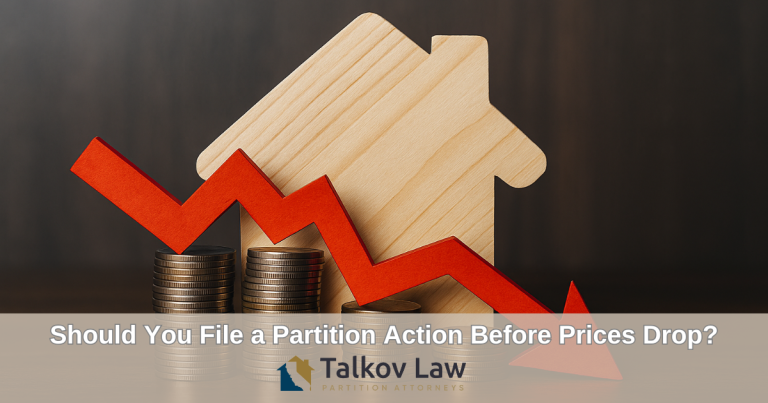Partition actions in California are most effective when filed before home values begin to fall. If you’re involved in the co-ownership of real property and notice signs of a declining market—rising interest rates, increased inventory, or more price cuts—now may be the time to act.
Filing early can mean the difference between preserving your equity and watching it slowly disappear. The cost of a partition action can increase as values fall, equity shrinks, and disputes drag on.
At Talkov Law Partition Attorneys, we’ve helped hundreds of co-owners resolve these disputes efficiently and profitably by getting ahead of California market trends. Waiting too long often results in avoidable financial losses.
Timing Matters in Both Real Estate and Partition Law
Most California partition actions result in a court-ordered sale and division of the proceeds. But when you initiate the process can significantly affect how much you walk away with.
For example, if your half of a $1 million home with no mortgage is worth $500,000 today, and the market drops by 10%, your equity could fall to $450,000.
That’s $50,000 gone—not including legal fees, potential rent offsets, or lost leverage.
Delays tactics are common in co-ownership disputes when one party refuses to sell, lives in the property rent-free, or stalls negotiations hoping things improve. The law gives you an exit, but time is not on your side.
Filing early means:
- Selling at today’s market value before further depreciation
- Preserving your full equity share
- Forcing progress when your co-owner won’t act
What If Your Co-Owner Won’t Sell?
They don’t need to agree. As long as you have not signed away (waived) your rights in a written agreement, you can still move forward under your absolute right to partition.
Under California Code of Civil Procedure § 872.210, any co-owner—no matter how small their share—has the right to file a partition action. The court can order a sale even if:
- You own less than 50%
- Your co-owner refuses to sell or cooperate
- They live in the property and want to stay indefinitely
This law exists because no one should be forced to stay locked in a real estate partnership that no longer works. Still, we see co-owners wait far too long—hoping things will resolve informally—while their equity and leverage slip away.
If you’re dealing with someone who refuses to cooperate, you may want to read our guide on how to remove a co-owner from a house title in California.
Why Market Trends Matter in Partition Cases
Partition actions aren’t just legal tools—they’re financial decisions. And in a softening market, waiting even a few months can cost you significantly.
Here’s what recent California data shows:
- In the Bay Area, home values dropped 2.5% year-over-year, according to the San Francisco Chronicle
- According to a California Housing Market Report by Zillow, even in high-demand Silicon Valley, values declined 2% during that same period
- Across California, active listings surged 44% year-over-year—well above the national gain of 28%—suggesting mounting downward pressure on prices.
These aren’t theoretical risks. They’re measurable shifts happening now—and if your interlocutory judgment of partition lags behind, you may be forced to sell after values have already dropped.
Real Estate Might Rebound—But Your Equity Might Not
Some co-owners believe the market will recover and that waiting will pay off. But even if prices bounce back in a year or two, there’s no guarantee your equity will. That’s because legal delays, rising interest rates, and shifting market conditions can all work against you.
By waiting, you may also be:
- Losing the ability to use your equity for a down payment on your next home
- Giving up leverage while your co-owner lives in the home for free
- Opening yourself to claims for mortgage contributions, taxes, or property improvements
- Racking up legal fees in a longer dispute
The cost of waiting is rarely just financial—it’s emotional, too. Partition actions bring clarity, closure, and a clean break when co-ownership is no longer viable.
Don’t Wait for the Dip
If you’re seeing signs of a market slowdown—or are already stuck in a co-ownership dispute—now is the time to act. With over partition cases handled and twelve full-time attorneys on our team, Talkov Law’s California partition attorneys are ready to guide you through every step.
We’ve resolved cases involving inherited property with siblings, investment properties, former partners, and co-owners refusing to sell. We know how to move quickly—and we don’t charge fees unless we win.
Call (877) PARTITION or contact us online to schedule your free consultation.
Will a Declining Market Affect How Much I Get From a Partition Sale?
Absolutely. Waiting too long could mean walking away with significantly less when the court-ordered sale happens.
What If My Co-Owner Is Living in the Property and Won’t Agree to Sell?
That doesn’t stop you. The court can still order a sale, and you may even be entitled to an offset for your co-owner’s exclusive use of the home.



![Letter Warning of Partition Action [Free Template Form Example] Partition Cover Letter California](https://talkovlaw.com/wp-content/uploads/2023/03/Partition-Cover-Letter-California-140x140.jpg)



































































































































